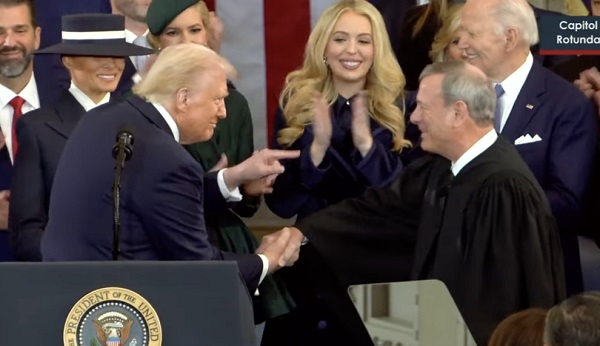From The Center Square
Group files suit over DOGE secrecy on Trump’s first day
President Donald Trump promised Americans that their federal government would operate more efficiently with the creation of the Department of Government Efficiency.
“My administration will establish the brand new Department of Government Efficiency,” the 47th president said to applause from Republicans.
Trump’s remarks on DOGE came the same day as a nonprofit group joined a union to file suit over the outside agency, alleging its secret meetings violate federal law.
The complaint, filed by Public Citizen and the American Federation of Government Employees, alleges DOGE violates the Federal Advisory Committee Act because “members do not have a fair balance of viewpoints, meetings are held in secret and without public notice and records and work product are not available to the public.”
“AFGE will not stand idly by as a secretive group of ultra-wealthy individuals with major conflicts of interest attempt to deregulate themselves and give their own companies sweetheart government contracts while firing civil servants and dismantling the institutions designed to serve the American people,” AFGE National President Everett Kelley said in a statement. “This fight is about fairness, accountability, and the integrity of our government.”
Trump spoke about DOGE during his inauguration after making bold promises for the department after winning the 2024 election.
Trump picked Tesla CEO Elon Musk and businessman Vivek Ramaswamy to lead DOGE. Trump said the new group will pave the way for his administration to “dismantle government bureaucracy, slash excess regulation, cut wasteful expenditures and restructure federal agencies.”
Both Musk and Ramaswamy attended Trump’s inauguration Monday. The two men previously outlined their plans for DOGE, which includes reducing regulations that would lead to mass layoffs of federal employees.
“A drastic reduction in federal regulations provides sound industrial logic for mass head-count reductions across the federal bureaucracy,” Musk and Ramaswamy wrote in an op-ed for the Wall Street Journal in November. “DOGE intends to work with embedded appointees in agencies to identify the minimum number of employees required at an agency for it to perform its constitutionally permissible and statutorily mandated functions.”
AFGE, which represents more than 800,000 workers in nearly every federal agency, had previously denounced DOGE. Kelley said it will hollow out the federal government and its workforce.
“By their very nature, cuts of this size also would require slashing spending on our military, homeland security, federal law enforcement, and virtually every aspect of our government operations,” he said. “This kind of financial pressure would lead to painful, widespread reductions in services that will affect Americans from every walk of life.”
Trump has promised to cut “hundreds of billions” in federal spending in 2025 through the reconciliation process. DOGE co-leader Musk initially suggested DOGE could cut $2 trillion in spending. Musk more recently said the group will aim for $2 trillion, but likely come up with half that amount.
Congress controls the purse strings for discretionary spending, which totaled about $1.7 trillion in 2023. Congress generally allocates about half of its discretionary spending to the U.S. Department of Defense.
“The number of federal employees to cut should be at least proportionate to the number of federal regulations that are nullified: Not only are fewer employees required to enforce fewer regulations, but the agency would produce fewer regulations once its scope of authority is properly limited,” Musk and Ramaswamy wrote. “Employees whose positions are eliminated deserve to be treated with respect, and DOGE’s goal is to help support their transition into the private sector. The president can use existing laws to give them incentives for early retirement and to make voluntary severance payments to facilitate a graceful exit.”
Congress has run a deficit every year since 2001. In the past 50 years, the federal government has ended with a fiscal year-end budget surplus four times, most recently in 2001.
Last week, the federal government reported net costs of $7.4 trillion in fiscal year 2024, but it couldn’t fully account for its spending. The U.S. Government Accountability Office, which is Congress’s research arm, said that the federal government must address “serious deficiencies” in federal financial management and correct course on its “unsustainable” long-term fiscal path.
























